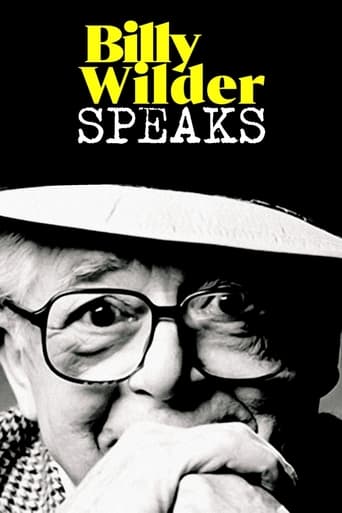MartinHafer
Billy Wilder was a genius when it came to writing and directing films. There's no doubt about that and listening to him reminisce makes this documentary worth seeing--particularly for film buffs like myself. I thoroughly enjoyed listening to him talking with Volker Schlöndorff ("The Tin Drum"). However, from a technical point of view, the film really sucks as well. Let me explain. There are a could serious problems which could have and should have been dealt with--especially since the film was made by a director about a director. The conversation often lacks a systematic focus. Often, the chronology of what they are talking about is all mixed up and you'd think there'd be some sense of cohesion to the conversation in the film. There isn't...and it is odd. The total effect is like overhearing a couple guys talking but only catching a bit here and there.
Robert J. Maxwell
I guess every director, like every human being, has quirks. Ford chewed on a hankie. Hawks spoke in a drawl so slow that it sounded at times like an old-fashioned vinyl 78 record being played at 45 rpm. Hitchcock always wore a dark suit on the set and in his earlier years made sure that the point of one of his collars curled upward.Billy Wilder's criterial attribute was body motion. He's never still. He never WAS still. The guy was in his mid-80s during these half dozen interviews with Schlondorff and he's constantly gesturing, twisting his head around, blinking, scratching his back, fiddling with some object like a pair of eyeglasses. When he was working he stalked around waving a walking stick, a very animated gnome.I'm not sure that anyone who is already familiar with his work will find out much new in these talks. There is the story of Marilyn Monroe unable to remember her single line -- "Where's that bourbon?" -- and Wilder having the line printed in large letters and taped to the walls and furniture. After some sixty takes of the scene, Wilder drew her aside and asked why there was a problem. Monroe: "What problem?" Wilder had other, less spectacular difficulties, with other performers but he holds no grudges and gives them credit for their various virtues. He's not mean about anyone he's worked with. As he tells Schlondorff, his philosophy is that you're not married to someone you happen to be working with. The arrangement lasts only a few months.He's great on anecdotes but seems to have told them so often that he's no longer excited or amused by them. At any rate, he doesn't laugh at them any more. And he tells them in a rushed tempo, sometimes in English, sometimes in German, and sometimes in a macaronic mixture of both, in a voice so studded with hesitations and stuttering that it's sometimes a little difficult to follow him in either language. "So -- so -- I told da -- da -- da sound man to crank up da -- da -- volume -- ent -- ent -- denn zwar lacherlich." He's not especially articulate. His metaphors are grounded in everyday experience. To Wilder, a successful movie should sweep the audience up, hold them in a choke around the neck, and never let them be reminded that they're just watching a movie. God forbid he should ever come up with a hoity-toity expression like "the suspension of disbelief" or "the epoche of the common man." It's an interesting documentary about a fascinating man who suffered a great deal of grief in Europe and who managed to sublimate his bitterness in art.
moonspinner55
Oscar-winning filmmaker and screenwriter Billy Wilder is interviewed in 1988, speaking rapidly in both English and German, touching on his perception of life through the camera lens via his childhood in war-torn Europe. Of course no Wilder conversation would be complete without behind-the-scenes stories on his many classic films, and wily Wilder seems happy to oblige our fascination with titles like "The Seven Year Itch", "Some Like It Hot", and "The Apartment". His recollections of working twice with actress Marilyn Monroe are particularly interesting, as are his off-camera skirmishes with Humphrey Bogart ("He did mock my accent..but everybody mocks my accent.") and James Cagney ("We were not of the same political persuasion."). Wilder is modest about his talents, grateful for the triumphs but well aware of the hurdles he had to maneuver to get his best work accomplished. Film historians will find this a wonderful documentation.
Michael_Elliott
Billy Wilder Speaks (2006) *** (out of 4) Director Volker Schlondorff interviews legendary director Billy Wilder over a two week period and gets his thoughts on his films, writing and various other things. Overall it's a nice chat with Wilder but several times the director goes off topic with stuff that's not really interesting. I hoped there would be more of a commentary on his films but that's not the case, although he does have a few good thoughts on Monroe, Bogart doing comedy and other things.This is now available on DVD and can also be seen on TCM.



